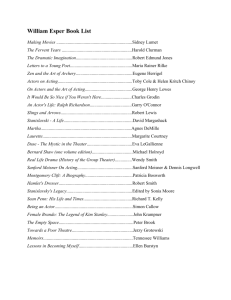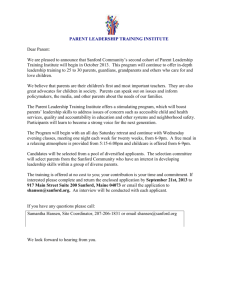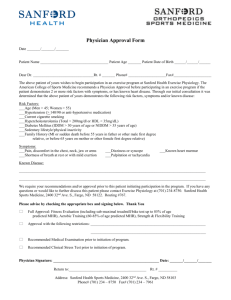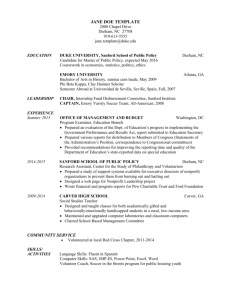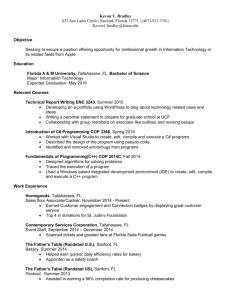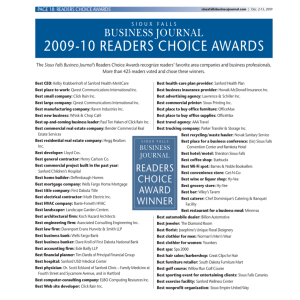Administrative Order - Workers' Compensation Billing Order: John M
advertisement
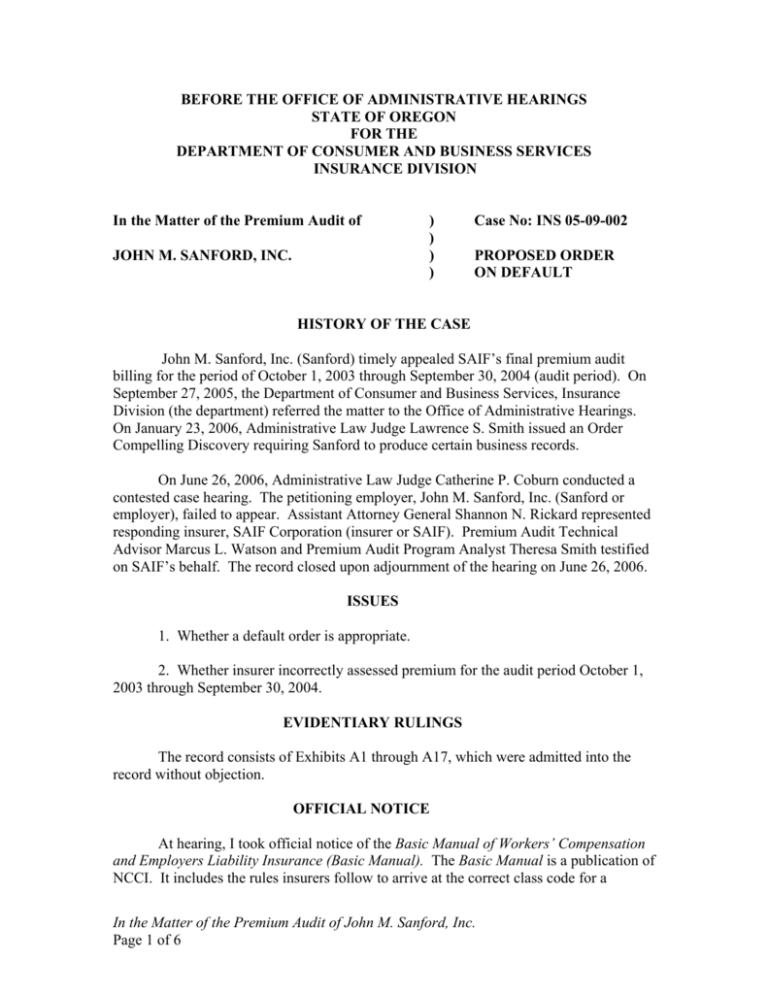
BEFORE THE OFFICE OF ADMINISTRATIVE HEARINGS STATE OF OREGON FOR THE DEPARTMENT OF CONSUMER AND BUSINESS SERVICES INSURANCE DIVISION In the Matter of the Premium Audit of JOHN M. SANFORD, INC. ) ) ) ) Case No: INS 05-09-002 PROPOSED ORDER ON DEFAULT HISTORY OF THE CASE John M. Sanford, Inc. (Sanford) timely appealed SAIF’s final premium audit billing for the period of October 1, 2003 through September 30, 2004 (audit period). On September 27, 2005, the Department of Consumer and Business Services, Insurance Division (the department) referred the matter to the Office of Administrative Hearings. On January 23, 2006, Administrative Law Judge Lawrence S. Smith issued an Order Compelling Discovery requiring Sanford to produce certain business records. On June 26, 2006, Administrative Law Judge Catherine P. Coburn conducted a contested case hearing. The petitioning employer, John M. Sanford, Inc. (Sanford or employer), failed to appear. Assistant Attorney General Shannon N. Rickard represented responding insurer, SAIF Corporation (insurer or SAIF). Premium Audit Technical Advisor Marcus L. Watson and Premium Audit Program Analyst Theresa Smith testified on SAIF’s behalf. The record closed upon adjournment of the hearing on June 26, 2006. ISSUES 1. Whether a default order is appropriate. 2. Whether insurer incorrectly assessed premium for the audit period October 1, 2003 through September 30, 2004. EVIDENTIARY RULINGS The record consists of Exhibits A1 through A17, which were admitted into the record without objection. OFFICIAL NOTICE At hearing, I took official notice of the Basic Manual of Workers’ Compensation and Employers Liability Insurance (Basic Manual). The Basic Manual is a publication of NCCI. It includes the rules insurers follow to arrive at the correct class code for a In the Matter of the Premium Audit of John M. Sanford, Inc. Page 1 of 6 business and the official description for all class codes filed with the department. The Basic Manual is a required part of every insurer’s audit procedure guide. OAR 836-43115(1)(a). I also took official notice of another NCCI publication, the Scopes of Basic Manual Classifications (Scopes Manual). The Scopes Manual consists of a numerical listing of class codes with descriptive terminology and examples of types of business activities that have been included in class codes in the past. FINDINGS OF FACT 1. Sanford operates a contract logging operation. (Ex. A10-4.) 2. In a letter dated February 9, 1995, SAIF informed Sanford, “Payments made to reimburse your workers for time or expenses to travel to and from work, or to and from a specific job site, is considered subject payroll for workers’ compensation reporting purposes.” (Ex. A2-5.) 3. Sanford paid its loggers a daily rate of $190 to $200 per day, plus a flat mileage rate1 to reimburse employees for the cost of commuting to and from work. (Testimony of Watson and Smith.) Sanford’s business records showed each employee’s reimbursement amount separately. (Id.) Three employees were each reimbursed for more than 3,000 miles in one month. (Exs. A10-10 and 11, A13-1, 4 and 6.) One employee was reimbursed for varying numbers of miles from his home to the same job site, all in excess of the number of miles listed on mapquest. (Exs. A9-2. A14-198 and A18.) Several employees were reimbursed for mileage on “blow out” days when no work was performed due to weather conditions. (Ex. A14-198.) John Sanford approved mileage reimbursement claims submitted by his employees without checking their accuracy. (Testimony of Smith.) 4. Sanford excluded mileage reimbursements for the purpose of paying premium, but included the mileage reimbursements for purposes of obtaining time loss benefits for employees who were injured on the job. (Exs. A8-7 and 20.) 5. Sanford’s employees commonly worked as timber fallers and mechanical operators at the same job site on the same day. (Exs. A10-10 through 17; A14-14 and 34.) Sanford failed to maintain verifiable payroll records by job site, disclosing when the job was performed, the job occupations at the site, and the types of mechanized equipment utilized. (Testimony of Watson and Smith.) 6. On July 13, 2005, Sanford requested a hearing. On April 12, 2006, the Office of Administrative hearings notified Sanford of the time and place of the hearing set for June 26, 2006. Sanford failed to appear and provided no information concerning any circumstances beyond its reasonable control that may have prevented its appearance at hearing. 1 Employer paid $.36 per mile through January 2004 and then $.375 per mile. In the Matter of the Premium Audit of John M. Sanford, Inc. Page 2 of 6 CONCLUSIONS OF LAW 1. A default order is appropriate. 2. Insurer correctly assessed premium for the audit period October 1, 2003 through September 30, 2004. OPINION 1. Default OAR 137-003-0670 provides in pertinent part: (1) ***** the administrative law judge may issue a final order by default: ***** (c) Except as provided in section (2) of this rule, when the agency or administrative law judge notified the party of the time and place of the hearing and the party fails to appear at the hearing; ***** (2) If the party failed to appear at the hearing and, before issuing a final order by default, the agency or administrative law judge finds that the failure of the party to appear was caused by circumstances beyond the party's reasonable control, the agency or administrative law judge may not issue a final order by default under section (1)(c) of this rule. In this case, the administrative law judge shall schedule a new hearing. (3)(a) An agency or administrative law judge may issue an order adverse to a party upon default under section (1) of this rule only upon a prima facie case made on the record. The agency or administrative law judge must find that the record contains evidence that persuades the agency or administrative law judge of the existence of facts necessary to support the order. On July 13, 2005, Sanford requested a hearing. On April 12, 2006, the Office of Administrative hearings notified Sanford of the time and place of the hearing set for June In the Matter of the Premium Audit of John M. Sanford, Inc. Page 3 of 6 26, 2006. Sanford failed to appear and provided no information concerning any circumstances beyond its reasonable control that may have prevented its appearance at hearing. Moreover, having reviewed the record, I find that it contains prima facie evidence favoring insurer in this matter. Therefore, a default order is appropriate. 2. Premium Audit Inasmuch as Sanford is the party seeking redress before the department concerning SAIF's final premium audit billing for the audit period, it has the burden of proof in establishing its position on the issues by a preponderance of the evidence. See ORS 183.450(2); Harris v. SAIF, 292 Or 683 (1982) (general rule regarding allocation of burden of proof is that burden is on the proponent of the fact or position); Cook v. Employment Div., 47 Or 437 (1982) (in the absence of legislation adopting a different standard, the standard in an administrative hearing is by a preponderance of the evidence); Salem Decorating v. Natl. Council on Comp. Ins., 116 Or App 166 (1992), rev den 315 Or 643 (1993) (in premium audit cases, burden of proof is on the employer). Proof by a preponderance of evidence means that the fact finder is persuaded that the facts asserted are more likely true than false. Riley Hill General Contractors v. Tandy Corp., 303 Or 390 (1989). a. Mileage Reimbursement The Insurance Division has established a three-step test for determining whether mileage reimbursement is excludable from premium audit for purposes of obtaining workers’ compensation insurance coverage. In the Matter of Sawdust Cutting Company, Final Order (January 31, 1991); In the Matter of Bob Wilkes Falling, Inc., Final Order (March 28, 1990). The first question is whether the employer paid employees for expenses incurred upon the business of the employer. The second question is whether the amount of each employee’s expense payments is shown separately in the employer’s records. The third question is whether the expense reimbursement approximated the actual expense incurred by the employee. Here, Sanford asserts that the mileage reimbursements should be excluded from payroll. However, the record establishes that Sanford’s scheme fails the first and third prongs of the test. To begin, Sanford paid mileage to reimburse employees for the cost of commuting to and from work. Commuting is not a work-related activity, and the cost of commuting is not an expense incurred upon the business of the employer. See Philpot v. The State Ind. Acc Com., 234 Or 37 (1963). Secondly, Sanford’s business records showed each employee’s reimbursement amount separately. Third, the expense reimbursements did not approximate the actual expense because Sanford’s business records reflected discrepancies and inflated amounts in the commuting miles reimbursed. For example, three employees were each reimbursed for more than 3,000 miles in one month. Similarly, one employee was reimbursed for varying numbers of miles from his home to the same job site, all in excess of the number of miles listed on mapquest. Additionally, several employees were reimbursed for mileage on “blow out” days when In the Matter of the Premium Audit of John M. Sanford, Inc. Page 4 of 6 no work was performed due to weather conditions. Moreover, John Sanford approved mileage reimbursement claims submitted by his employees without checking their accuracy. Furthermore, Sanford excluded the mileage reimbursement for the purpose of paying premium, but included the mileage reimbursement for purposes of obtaining time loss benefits for employees who were injured on the job. Consequently, the mileage reimbursement is not excludable from payroll for purposes of obtaining workers’ compensation coverage. Therefore, SAIF correctly included mileage reimbursement in the premium audit. b. Class Codes NCCI Basic Manual Class Code 2725 provides: Operations Mechanized Equipment Operations & Drivers. This classification applies to those logging sites that are completely mechanized: where all operations at the logging site are performed exclusively by employees or subcontractors who in the course of their moving logs do not leave the cab of the mechanized equipment they are operating, and no on-the-ground work is performed by any employees, except for repair and maintenance of equipment, log branding and supervisors. Where large trees are harvested by nonmechanized methods while the mechanized equipment is at the job site, the entire shall be classified as Code 2702—Nonmechanized logging. This classification may be assigned only when verifiable payroll records are maintained by job site, disclosing when the job was performed, the job occupations at the site, and the types of mechanized equipment utilized. See Logging Notes 1, 2, 3, and 4. Additionally, NCCI Basic Manual Class Code 2702 provides: Nonmechanized Equipment Operations & Drivers. Where bucking, falling, or limbing is performed by persons who furnish their own power equipment (such as, but not limited to, chain saws) under an agreement in which the rental value of such equipment is included in the contract price for such operations, not less than 80% of such total amount paid such persons shall be included as payroll for the purposes of establishing the basis of premium or such operations. See Logging Notes 1, 2, 3 and 4. In the Matter of the Premium Audit of John M. Sanford, Inc. Page 5 of 6 Logging payroll is properly assigned to Class Code 2725 only for job sites where all work is completely mechanized. Additionally, this classification may be assigned only when verifiable payroll records are maintained by job site, disclosing when the job was performed, the job occupations at the site, and the types of mechanized equipment utilized. In the alternative, where mechanized and nonmechanized logging takes place on the same day at the same job site, all payroll is assigned to Class Code 2702. In this case, Sanford’s employees commonly worked as timber fallers and mechanical operators at the same job site on the same day. Furthermore, Sanford failed to maintain verifiable payroll records by job site, disclosing when the job was performed, the job occupations at the site, and the types of mechanized equipment utilized. For these reasons, SAIF correctly assigned Class Code 2702. ORDER SAIF’s final premium audit billing for the audit period of October 1, 2003 through September 30, 2004 is correct and payable. IT IS SO ORDERED. Dated this 13th day of July, 2006. /s/ Catherine P. Coburn Catherine P. Coburn Administrative Law Judge Office of Administrative Hearings NOTICE OF OPPORTUNITY FOR ADMINISTRATIVE REVIEW NOTICE: Pursuant to ORS 183.460, the parties are entitled to file written exceptions to this proposed order and to present written argument concerning those exceptions to the Director. Written exceptions must be received by the Department of Consumer and Business Services within 30 days following the date of service of this proposed order. Mail exceptions to: Department of Consumer and Business Services Mitchel D. Curzon, Chief Enforcement Officer Oregon Insurance Division 350 Winter Street NE Room 440 Salem, OR 97301-3883 In the Matter of the Premium Audit of John M. Sanford, Inc. Page 6 of 6
